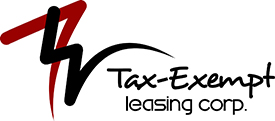What is tax-exempt leasing?
Tax-exempt leasing (sometimes referred to as “financing”, “lease financing” or “lease purchase”) is a financing tool that allows tax-exempt entities to acquire essential use equipment now and pay over time.
Under a tax-exempt lease, title to the equipment passes to the customer at lease signing and the customer owns the equipment at the end of the term with no liens attached. There is no residual at the end nor any end-of-lease buyout. Because the Lessee is tax-exempt, the Lessor is not required to pay federal income taxes on the interest generated by the lease. Thus, lower financing rates are available.
Municipal leases are the most common tax-exempt lease and are designed specifically to meet the needs of local and state government organizations. These leases typically contain a non-appropriation clause. In the event that the Lessee is unable to obtain funding for future payments (because of budgetary issues), this clause allows the Lessee to terminate the lease at the end of the current appropriation period without any further obligation.
